How US and France are battling al-Qaeda in Africa
- Published
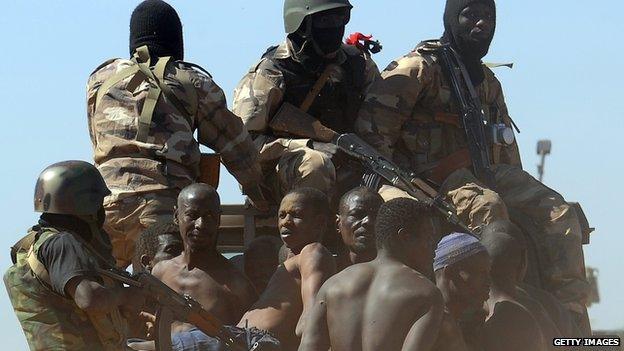
Malian soldiers arrest suspected Islamist militants earlier this year
Although often seen as rivals in global politics, the US and France are working together to prevent parts of Africa from falling into the hands of al-Qaeda-linked fighters.
These Western countries - and their allies - want Africa to do more to promote stability so that extremists can be effectively denied room to operate.
'Sense of embarrassment'
The repeated need for Western intervention in African conflicts has raised questions about the continent's efforts to achieve stability.
''There is a sense of frustration," said Comfort Ero, Africa director at the International Crisis Group (ICG).
"Some African leaders would tell privately tell you that there is a sense of embarrassment.''
In Mali, the French militarily intervened in January to prevent militants from taking over the country.
Libya has descended into chaos and is now thought to be home to many radical Islamist groups.
Now, French intervention has also become necessary in the Central African Republic (CAR) following a takeover by mainly Muslim rebels which has led to clashes with the Christian community.
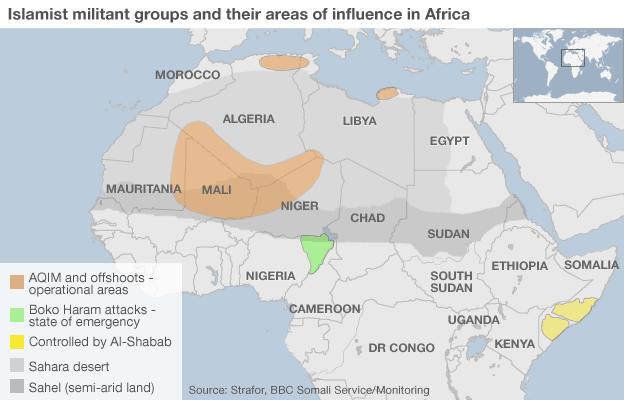
After years of talk about establishing a robust military force to intervene in African conflicts, lack of political will is holding back progress.
"Up to a certain extent, the Africans have become prisoners of their own rhetoric - [that] African problems need African solutions," said Roland Marchal, a senior research fellow specialising in Africa at Sciences-Po in Paris.
A number of African countries prefer interventions such as those seen in Mali and the CAR because they are a good way to get military funding, he added.
But Ms Ero cautions against any assumption that Africa must alone address crises that have international impact.
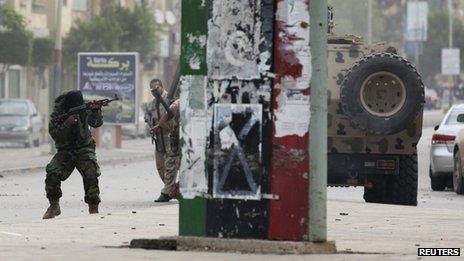
Islamist group Ansar al-Sharia has taken advantage of Libya's power vaccuum
"While there is a desire and more willingness to see an African response, the continent still requires a significant amount of international assistance," she told the BBC.
She added that the challenge today is to provide a careful assessment of what the African Union can, realistically, achieve in trying to provide peace and security responses in the continent.
Intelligence sharing
The US and France see some obligation in being part of the fight against terrorists in Africa.
After all, al-Qaeda attacked US embassies in Kenya and Tanzania in 1998. Militants thought to be affiliated to al-Qaeda in West Africa continue to kidnap French nationals, and threaten French business interests in the region.
In February this year, the US deployed 100 troops to Niger to assist French forces in neighbouring Mali in their hunt for al-Qaeda-linked militants.
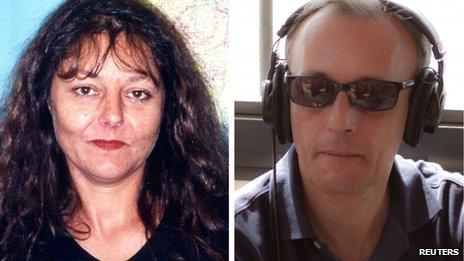
French journalists Ghislaine Dupont and Claude Verlon were killed by gunmen in northern Mali last month
Their mission is to focus on "intelligence sharing", an official said.
According to media reports, the US now flies surveillance drones from Niger, tracking militants across a hostile desert region that is home to unstable states sharing porous borders.
Although their joint counter-insurgency operations with a number of African countries are seen as crucial, questions remain over the sustainability of international intervention.
In the absence of a robust African force, France has had to step in a number of times to intervene in local conflicts.
In situations where an African force has intervened, they have often faced financial bottlenecks.
In Somalia, an African Union (AU) mission - backed by the UN - has managed to beat back Islamist militant group al-Shabab. But the force's effectiveness is hindered by a lack of helicopters and other logistics.
Hawa Ahmad Youssof, a special representative at the AU, says there have always been attempts at the pan-African organisation to resolve "ourselves our problems".
"You know, it's not easy at all because our continent is always facing so many challenges," she said.
France's involvement in Africa - at least in former its colonies - is intimate, historical and almost sentimental, with its business and security interests at stake.
Despite reports that Paris is keen on pulling back from Africa and only focusing on intervention backed by UN resolutions, Mr Marchal doubts a major shift in relations.
"You can't erase your own history. There would be always be some specificities in the links between Africa and France," he told the BBC.
'Difficult work'
US officials are equally concerned to have a stable Africa in the fight against extremists.
"A safe, stable, and secure Africa is in our nation's enduring interest, as it is also key to the security and prosperity of the international community," Benjamin Benson, the chief media officer at the US Africa Command (Africom), told the BBC.
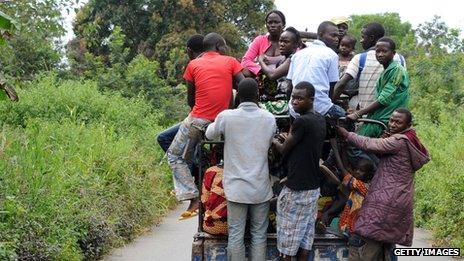
There are fears that jihadist groups could take advantage of anarchy in CAR
The main US mandate in Africa is to support nations so they can effectively fight militants.
US interests have been the subject of terror attacks in Africa, and Washington is not taking any chances.
"We cannot rely on short-cuts when confronting the terrorism challenge in Africa… It is difficult work. Violent extremism requires more than just a security response," a state department official told the BBC.
At Africom, Mr Benson said al-Qaeda and its affiliates in Africa present the most immediate security challenge to US interests in the region, and countering this threat is a top priority.
However, Washington has had to deal with the frustration that no African country is willing - at least in public - to host its Africom infrastructure and personnel.
The result is that the US either engages individual countries in counter-terrorism efforts or under a UN banner. Washington also resorts to unilateral action, especially in Somalia.
After its intervention in Mali, France remains active in West Africa, partnering with the US and local armies to try to stop the Algeria-based al-Qaeda in Land of Islamic Maghreb (AQIM), from expanding.
From Djibouti, the US is flying armed drones from a former French base - now the main US military facility in Africa - to hunt down militants from Somalia's al-Qaeda affiliate, al-Shabab.
But even though Africa may be frustrated that it has not been able to find its own solutions, it has little option but to continue working with the West on counter-terrorism initiatives.
At least, not as long as local militant groups in Africa continue to seek ties with international jihad.
- Published6 December 2013
- Published30 May 2013
- Published29 May 2013